(Attempt to disguise coied text. All sections now started. Pictures added. Incomplete gone) |
(Video link) |
||
| Line 45: | Line 45: | ||
==External Links== | ==External Links== | ||
{{GSearch|Foudia+madagascariensis}} | {{GSearch|Foudia+madagascariensis}} | ||
| − | [[Category:Birds]][[ | + | <br /> |
| + | {{Video|Red_Fody}} | ||
| + | |||
| + | [[Category:Birds]][[Category:Foudia]] [[Category:Videos]] | ||
Revision as of 09:07, 13 June 2016

Photo by iainhawk
Mahe, the Seychelles, February 2006
- Foudia madagascariensis
Identification
13 cm (5 in)
Breeding Male:
- Crimson head and breast
- Black lores
- Black central streaks on mantle
- Blackish upper wings and tail
- Conical black bill
- Brown iris
- Males also occur in a yellow morph.
Female
- Greenish-brown forehead, front and top of head
- Black streaks on nape
- Greenish-brown cheeks, lores, chin and throat
- Greenish-yellow supercilium
- Pale brown bill
- Brown iris
Immature and non breeding males are similar to females
Distribution
Madagascar with several smaller islands.
They have been introduced to many Indian ocean islands, such as the Seychelles.
Taxonomy
This is a monotypic species[1].
Subspecies bruante is not recognised by most authorities[2]
Habitat
They can be found in town gardens, spiny forests, open country and savanna.
Behaviour
Diet
Their diet consists mostly of seeds, but they also include nectar and arthropods.
Breeding
The oval nest is made from strips of grass woven together by the male. The entrance is near the top. It is attached to reeds, tall grass shrubs or trees. The clutch consists of 2-4 pale bluish-green eggs which are incubated by the female. The chicks are fed by both adults.
References
- Clements, J. F., T. S. Schulenberg, M. J. Iliff, D. Roberson, T. A. Fredericks, B. L. Sullivan, and C. L. Wood. 2015. The eBird/Clements checklist of birds of the world: v2015, with updates to August 2015. Downloaded from http://www.birds.cornell.edu/clementschecklist/download/
- Avibase
- Handbook of the Birds of the World Alive (retrieved June 2016)
- Weaver Research Unit
- BF Member observations
Recommended Citation
- BirdForum Opus contributors. (2024) Red Fody. In: BirdForum, the forum for wild birds and birding. Retrieved 19 April 2024 from https://www.birdforum.net/opus/Red_Fody
External Links






